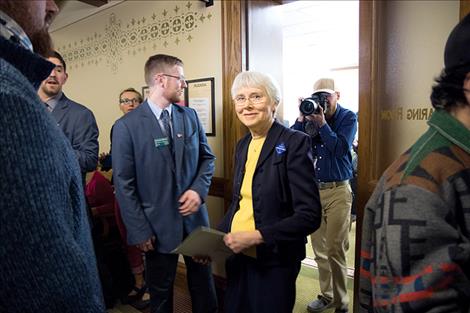Legislative update: some bills moving forward, others tabled
Hey savvy news reader! Thanks for choosing local.
You are now reading
1 of 3 free articles.
HELENA — With the 2017 legislative session halfway over, the Valley Journal looks at the progress of some notable pieces of legislation.
SB 305 would allow counties across the state to conduct mail-in balloting for the May 25 special election to replace former U.S. Rep. Ryan Zinke, who resigned to become secretary of the Interior. The legislation passed the Senate 37-13 but it was tabled in the House Judiciary Committee 11-8 on March 29. Supporters tried to “blast” the bill to the House floor on March 31. The vote was 51-49 and failed to get the necessary 60 votes to do so. Supporters said the measure would save money. Some opponents, mainly Republicans, believe it could boost turnout among Democrats, although Rep. Sharon Stewart-Peregoy, D-Crow Agency, opposed it because she felt it would hurt Native Americans who vote at satellite polling places on reservations.
SB 310, which would enable the Confederated Salish and Kootenai Tribes to withdraw from Public Law 280 for the purposes of prosecuting felonies for tribal members on the Flathead Indian Reservation, passed the Senate 35-15 on Feb. 24. House action is pending. If the tribes choose to withdraw from the agreement, the Federal Bureau of Investigation and the U.S. District Court in Missoula would take over felony prosecutions, which are currently handled by the county. In January, the Lake County commissioners voted unanimously to withdraw from the agreement due to lack of funds. That action was taken to begin the communications process with federal and state governments, the commissioners said.
HB 489 would provide some oversight of moored vessels on water bodies in the state. Rep. Mark Noland, R-Bigfork, sponsored the bill in response to a couple of boats that have been permanently located on Flathead Lake. The legislation would prohibit vessels from anchoring in any body of water for more than 14 days out of 28 consecutive days unless the vessel was moved at least one nautical mile. Owners of such moored vessels would be required to obtain registration and validation decals. The bill passed the House 60-38 on March 28. Action is pending in the Senate Natural Resources Committee.
HB 325 would create an exemption for producers of raw unpasteurized milk. Montana is one of 19 states that prohibit sales of raw milk, although some states allow such milk to the “shared.” The House passed the bill 69-30 on Feb. 22, but the Senate Agriculture, Livestock and Irrigation Committee tabled the bill by a vote of 6-5 on March 30.
SB 366 would allow drivers to obtain a Real ID-compliant driver’s license. As of Jan. 22, 2018, Montana driver’s licenses will no longer be an accepted form of ID for boarding an airplane, forcing flyers to use a passport, military ID or some other form of ID. The federal Real ID law was passed by Congress in 2005 in large part because four the 19 9/11 terrorists had used state-issued driver’s licenses to board planes. According to the Department of Homeland Security, Montana is one of four states that are not Real ID-compliant, the other being Maine, Missouri and Minnesota, although drivers in the latter can obtain enhanced driver’s licenses that enable them to board airplanes. As of Jan. 30, Montana residents could no longer use a state driver’s license to enter Malmstrom Air Force Base or Fort Harrison Veterans Administration Medical Center. The bill would allow residents to pay an extra $25 or $50 to obtain a Real ID-compliant driver’s license, depending on when they renewed their license. Passport fees for first-time applicants are $135 for adults and $105 for minors. Implementing the bill would cost the state $2.5 million. The Senate approved the bill on third reading 31-19 on March 31. Action is pending in the House.
HB 333, sponsored by Rep. Frank Garner, R-Kalispell, would authorize law enforcement agencies to administer the inhaler Narcan to someone suspected of a heroin or opiate overdose. The inhaler, which uses Naloxone, reverses the overdose and has been used by eastern states. “In many states, it’s standard for a first responder to carry,” said Deputy Lake County Attorney James Lapotka. The bill passed the House 98-0 on Feb. 20, and the Senate approved it 48-0 on April 1. The bill now heads to Gov. Steve Bullock.
HB 582, by Rep. Greg Hertz, R-Polson, named the “Montana Commercial Pet Breeders Act,” failed to advance when the House Business and Labor Committee tabled it on March 28. The bill would have required licensing and regular inspection of commercial pet breeders by the Board of Veterinary Medicine. It would have applied to breeders with eight or more female dogs or cats or those who sell 31 or more dogs a year.
















